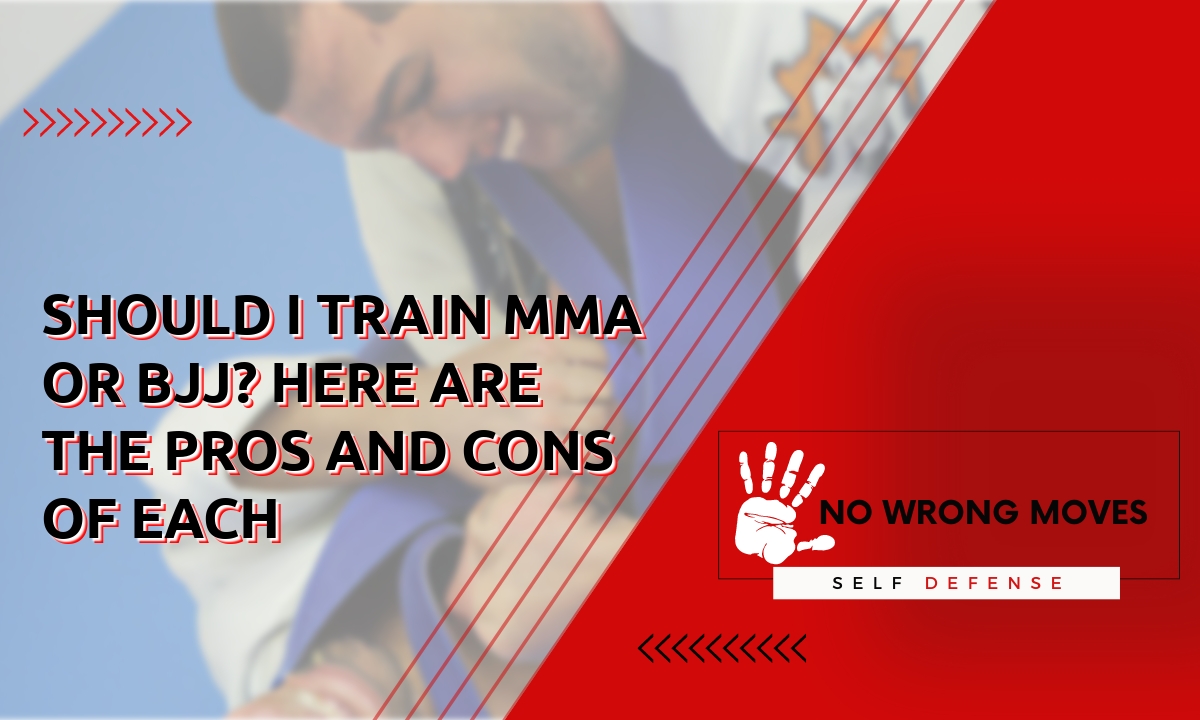
If you're an avid fan of martial arts, then you already know just how vast the world of combat sports is. With more than 180 different disciplines to choose from, your choices are nothing short of overwhelming.
When confronted with such a swathe of options, it's a good idea to trim them down and focus on two or three that appeal to you the most.
Two of the most prominent disciplines in the combat sports world right now are MMA and BJJ, both well-renowned martial arts that have grown massively over the last century alone. Both have their pros and cons, so if you're looking to enroll in one or the other, then read on.
What is MMA?

With a massive following and billions of dollars in its industry, mixed martial arts, or MMA, is quickly becoming one of the most popular combat sports in the world, easily competing with behemoths like boxing and wrestling. Practitioners of the sport find it easy to see why.
Unlike other martial arts, which often focus on specific techniques or fighting styles, MMA employs a mix--hence the name--of techniques from various other disciplines, offering a comprehensive fighting package that can be used in both competitive settings and real world scenarios.
Developing proficiency in MMA involves training an unusually large variety of maneuvers, from jabs, uppercuts, and grapples, all the way to positioning, ground control, and takedowns.
Furthermore, you're also wholly expected to use your entire body. Whereas some combat sports emphasize specific body parts, such as the arms in boxing or the legs in taekwondo, MMA involves everything you have at your disposal.
For many, part of the allure of MMA is the clash between different styles and different backgrounds. Judo athletes can find themselves squaring off against people from a sambo background, and wrestlers can test how their moves would fare against boxers.
Marketing for MMA originally leaned heavily into this. For audiences, it was a chance to see which martial art was the best. For professional fighters, it was a chance to prove that theirs was the best.
MMA thus demands quite a lot out of anyone who wants to give it a go. Those willing to endure all these difficult strides, however, will receive the fulfilling opportunity to learn from a diverse set of fighting styles that will keep them ready for any situation.
What is BJJ?
Brazilian jiu-jitsu, or BJJ, as it's commonly abbreviated, is a renowned martial art that focuses on ground work and holds.
BJJ was founded by the Gracie brothers in 1925, when they incorporated techniques learned from Mitsuyo Maeda, a traveling judoka, into their own style. It has grown widely in popularity since then.
Whereas MMA looks into incorporating various techniques and preparing for the many different directions a bout can go, BJJ hones in on just one goal: submission, immobilizing the opponent and forcing them to tap out.
To this end, jujitsukas utilize their arms and legs to execute devastating maneuvers, such as sweeps and joint locks, to get their opponent to yield.
A key aspect of BJJ that has helped cement its popularity is that it can allow a smaller fighter to defeat a larger one.
By transferring a bout to the ground and preventing the opponent from moving, jujitsukas can nullify the strength of a superior enemy.
A fundamental example of this is the armlock, where a jujitsuka wraps most of their body in an opponent's arm, distributing their weight into just that one area and locking them down.
Another common example is the rear naked choke, which involves being behind someone then wrapping your arms around their neck, then keeping your hands firmly locked in place.
If done currently, moves like the rear naked choke can render someone unconscious in a matter of seconds, all while being unable to retaliate or break free.
Even though BJJ is but one aspect of fighting that MMA practitioners look into, make no mistake: BJJ is not easier. You'll just be focusing more time on learning these moves as opposed to a larger variety.
Why Pick MMA?

Arguably the greatest advantage of MMA over BJJ is that it's better for self-defense. This isn't to say that BJJ is bad--on the contrary, it will actually protect you quite wonderfully so long as you can get your opponent on the ground.
Note that last bit: on the ground. The aspect of BJJ that makes it so great is also the thing that's holding it back, at least when comparing it to MMA.
BJJ requires both you and your opponent on the ground in order for it to really shine. If this is taken away somehow, then you'll probably struggle--and hard.
There are just so many factors where things can go wrong: what if you're in a tight, confined area? What if you're on slippery or uneven terrain? What if your opponent has excellent reach or is armed? What if you just can't get your opponent onto the ground?
That last one is a particularly big consideration to keep in mind. BJJ is great against bigger opponents, but not necessarily against trained ones. What if they're capable of countering your moves? Or what if you're going up against multiple assailants?
Or what if they just hit you? Striking your opponent is illegal in Brazilian jiu-jitsu, so you won't be trained for that. There are so many considerations you'll need to keep track of, and all of them make it difficult for you to pull off BJJ maneuvers properly.
In contrast, many of these weaknesses are either greatly mitigated or outright nonexistent in MMA. Striking your opponent there is obviously legal, and your vast skillset means you'll always have moves in your arsenal to fight back with, regardless of where you are.
Plus, because MMA athletes incorporate elements from various disciplines, they'll still have the opportunity to learn about grapples and holds. Their knowledge will just be less specialized.
This may sound discouraging for BJJ enthusiasts, but don't feel too bad. BJJ is still excellent for self-defense. It just so happens that MMA is the better option here--and that's totally okay!
Why Pick BJJ?

The main reason someone might pick BJJ over MMA is specialization. Put bluntly, BJJ allows you to be extremely good at ground fighting, far better than what most other MMA practitioners are capable of.
Even though it relies on getting your opponent on the ground, once that actually happens, you can bet that you're going to win.
Another key consideration is that overall, injuries in BJJ are much less common. Granted, they still do happen, but they don't happen anywhere near as often as they do in MMA.
A look at the injury rate in MMA shows that athletes received 236 to 286 injuries over 1,000 exposures--that's about 1 in every 4 fights! BJJ in the exact same study didn't go anywhere near that number, with only 9 injuries for every 1,000.
Other studies support this as well. Note that the odds of you getting injured in BJJ aren't small enough to be ignored, but they're much less common and much less dangerous.
Which should you pick?

Mixed Martial Arts
- Much more general
- Greater risk of injury
- Teaches some BJJ principles
Brazilian Jiu-Jitsu
- Much more specialized
- Less effective at self-defense
- Will beat out MMA in ground fights
One thing to keep in mind when choosing between these two martial arts is that BJJ techniques and principles are deeply embedded into MMA. This is in no small part due to the nature of MMA itself.
So if you're a little undecided and want a taste of both, then your best bet is definitely to go for MMA.
Furthermore, if you're looking to become a more all-rounded, versatile fighter, then MMA should also be your preferred pick.
On the other hand, there's no wiggling around the fact that when it comes to ground fighting, immobilization, and holds, sports like BJJ are king. MMA fighters know this, and that's why they don't hesitate to employ principles from these martial arts into their own skillsets.
Ultimately, it comes down to what your goals are and what you want out of your classes. If you want to defend yourself, then MMA is the way to go. Want to become a jack-of-all-trades kind of fighter? Then it's MMA for you, definitely.
On the other hand, if becoming a specialist in one specific task sounds appealing to you, then definitely go for BJJ. Concerned about your safety? Then pick BJJ.
At the end of the day, both options are wonderful and are sure to be well worth the investment. BJJ and MMA both have so much to offer you, and it's great that you can see that.
[author-box-jpx-fitness]
